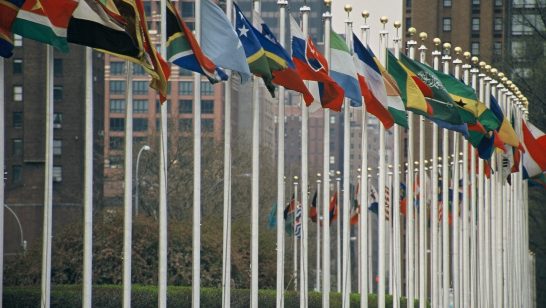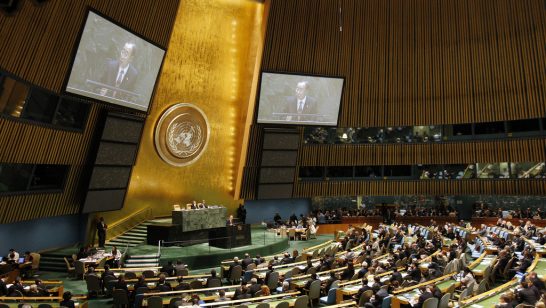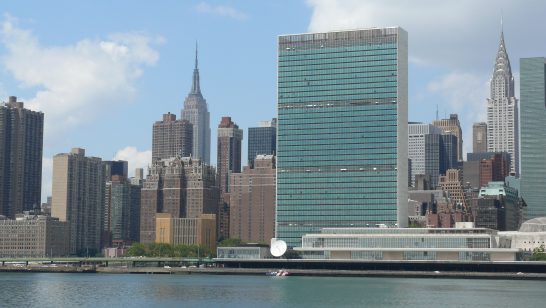
The first session of the Preparatory Committee for the 2020 Review Conference of the Treaty on the Non-Proliferation of Nuclear Weapons (NPT) was held from 2-12 May 2017 in Vienna. As the session’s chair Ambassador Henk Cor Van der Kwast announced the end of the session, a round of applause erupted and a sense of relief prevailed. But as one delegate described it, this year’s meeting was “calm from the outside but boiling beneath the surface.”
There are various reasons for the tensions. Disagreements between the 191 parties to the treaty on several key issues are sharp and deep-rooted. In the last review conference in 2015, discussions on nuclear disarmament and the Middle East proved to be too divisive, and the conference failed to adopt a consensual outcome document. Since then, little tangible progress has been achieved on either issue.
On the topic of nuclear disarmament, most of the non-nuclear weapons states remain deeply frustrated by the gap between rhetoric and action. This frustration has fuelled questions about the commitment of nuclear weapons states to disarmament. Perhaps the clearest sign of this frustration is that many such states have decided to seek action outside the NPT framework by backing negotiations for a legally binding treaty prohibiting nuclear weapons.
Similar frustration is felt on the issue of the Middle East. Five years earlier, Egypt’s walk-out of the 2012 Prepcom was a manifestation of a growing discontent in Cairo about the lack of seriousness in bringing Israel under the fold of the near-universal treaty. Over the years, this issue has been a constant strain on the NPT regime. Efforts to achieve progress through convening a Conference (planned initially for 2012) on the establishment of a “weapons of mass destruction-free zone” in the Middle East faltered during the previous review cycle. Disagreements on who to blame for this, and how to move forward, was key to the failure of the 2015 Review Conference.
Many of these differences and frustrations were visible during the 2017 Prepcom. Yet, none of the main actors were in for a fight. In the United States, the Trump administration had just started its nuclear policy review, the outcomes of which could only be a matter of speculation. In France, the elections brought a new president to the Élysée Palace. In the UK, all the energy was focused towards the nation’s first post-Brexit elections in early June 2017. The combination of these factors made the delegations from these three countries unable to strongly advocate any new position, opting instead to restate their long-standing positions. Russia and China both took the back seat, save for select interventions on the Middle East for Russia and on the DPRK for China. The nuclear weapons states and many of the non-nuclear weapons states seemed resigned to agree to disagree on the issue of the nuclear ban.
A similar dynamic was at play on the Middle East issue. Egypt has long been a prominent voice on the issue in the NPT context. But in the 2017 Prepcom, although Cairo knew what it didn’t want, what it did want was less clear. The Egyptian delegation fought off efforts to resurrect what were seen to be half-hearted attempts to re-launch the “2012” conference. Egypt’s statement and working paper on the issue explicitly expressed frustration on that failure. Yet, Cairo kept its cards close to its chest. During the Prepcom, it was silent on how to move the issue forward save for asking the co-sponsors of the 1995 Resolution (US, UK and Russia) to seek a way out of the impasse. Other regional states, including many Arab states, shared Cairo’s frustration but not its approach. Many of these states expressed support for continuation of efforts to launch the conference promised in the 2010 Review Conference action plan. On this issue, small cracks and differences, which had started to appear in the 2015 Review Conference, grew deeper. The clearest manifestation of these differences was the absence of a common Arab statement and the lack of consensus within NAM on producing a working paper on the Middle East issue.
On other issues, this was not a Prepcom for new or radical ideas but one where caution was prevalent. Support for entry into force for the Comprehensive Test Ban Treaty, calls for progress on fissile material ban were frequently repeated but no new proposals or ground breaking initiatives were proposed. On nuclear disarmament verification, a multi-year arms control simulation initiative between two nuclear weapons states (UK and US) and two Nordic states (Norway and Sweden) was announced. A short statement on North Korea drafted by France and South Korea gained wide support. The statement denounced DPRK’s nuclear tests and missile launches and urged Pyongyang to return to the NPT and IAEA safeguards. Key NAM states were noticeably absent from support to the statement.
In a break from previous tradition, the five nuclear weapons states did not deliver a common statement during the meeting or hold a conference before the Prepcom. This is mainly due to the political changes occurring in three out of the five states. The New Agenda Coalition, the Nuclear Non-proliferation Disarmament Initiative and Non-aligned Movement continued to be visible and active through common statements and working papers. New voices at this Prepcom included the Nordic states which coalesced on a common statement despite their differences on proposals for a legally binding nuclear ban, and the Gulf Cooperation Council states which gave a common statement delivered by Kuwait. Ambassador Adam Bugajski (Poland) was smoothly elected to chair the second 2018 session of the Prepcom in Geneva. Ambassador Raphaelle Grossi (Argentina) was nominated as President of the 2020 Review Conference: the position traditionally allocated to a country from the Non-aligned Movement.
The Prepcom benefited from the steady and calm approach of its Chair. Before the start of the Prepcom, Ambassador Van der Kwast engaged in a series of regional consultations and some bilateral visits allowing him to move forward efficiently when the meeting started. He presented his draft factual summary and procedural report on the penultimate day of the meeting, firmly establishing his intention that the discussion on the first and adoption of the second would end by 1 pm on the final day. The Chair also applied several innovations. For example, throughout debates, he implemented a traffic light system to warn speakers going over their allocated time. However, his efforts to encourage interactive debates were not very successful in shaking established diplomatic practice that gives priority to pre-prepared interventions.
The 2017 Prepcom provides ground for some optimism for the 2020 Review cycle. That optimism, however, can only be guarded. The relatively smooth operation of this Prepcom masks wide substantive differences in core areas. These differences, if not addressed, will continue to cast their shadow on the treaty as well as on global nuclear governance more broadly. The 2017 Prepcom also raises questions on whether the promise of a strengthened review process reached in 1995, and further elaborated in 2000, has been fulfilled. The purview of Prepcom meetings has expanded to include consideration of substantial matters in addition to matters of procedure. Unfortunately the 2017 meeting, like previous Prepcoms, was unable to leverage these discussions into a much needed effective or results-oriented review of the Treaty.
The opinions articulated above represent the views of the author(s), and do not necessarily reflect the position of the European Leadership Network or any of its members. The ELN’s aim is to encourage debates that will help develop Europe’s capacity to address the pressing foreign, defence, and security challenges of our time.



